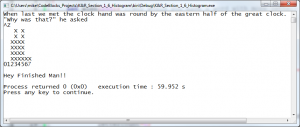Crappy and a little ad-hoc, and no sign of a recursive but it works for most counts.
…could do with handling multiple dice types throwdice(2,3,5,6,6,6,6) and maybe extend it to use a file instead of an array in memory(??).
Still it can push out a prodigious amount of numbers.
#include
#include
#include
#include
using namespace std;
int throwDice(int intDices,int DiceSides);
long dicecount=7;
int MaxSides=9; //3
long nRows=(int)pow(MaxSides,dicecount);
int* history=new int[nRows * dicecount]; //create a very large 1 dimensional array
int sum=0;
int main()
{
for (int j=0;j












